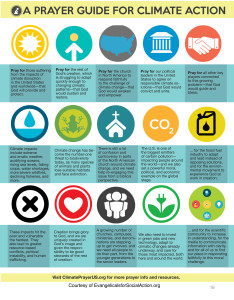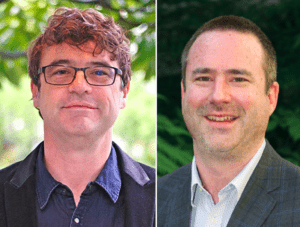
The writing is on the wall. According to a comprehensive and groundbreaking new report from the world’s foremost scientific experts, the impacts of climate disruption are expected to be “severe, pervasive, and irreversible.”
Founded over 25 years ago, the Intergovernmental Panel on Climate Change (IPCC) is an unprecedented collaboration of thousands of the world’s credentialed climate scientists to assess what we know about the changing climate, its current and projected impacts, and what we can do about it.
The governments of the 195 participating nations, including the United States, review all parts of the IPCC assessment reports before they are approved and released.
So the IPCC’s latest report, Climate Change 2014: Impacts, Adaptation, and Vulnerability (AR5-WGII), which breaks down diverse and far-reaching climate impacts by type and region, is about as serious as it gets. At the same time, however, it’s not really news. This report only confirms what many communities around the world are already experiencing—that the climate we have carefully built our lives around is changing and that we, along with the rest of God’s creation, are increasingly at risk.
Each of us—like each of our communities—is heavily dependent on stable surroundings in order to flourish. We’re vulnerable to changes in climatic patterns, which can have a disproportionate effect on the poor and those in less developed contexts. Impacts include higher sea levels, larger floods and storm surges, spreading diseases, melting ice and permafrost, harsher heat waves, failing crops, collapsing fisheries, acidifying oceans, more severe droughts and water shortages, and more.
As carbon pollution continues and climate impacts worsen, trying to make a difference here can frankly be overwhelming. Rather than give into apathy or despair, however, we’re called to be people of love and hope. Our hope is in a God who deeply loves the world, is on a mission to reconcile and restore all things back to shalom, and remains determined to include us in the process. God has blessed us with the capacity, understanding, and resources—and the Holy Spirit—needed to do the right thing and be part of overcoming this growing environmental and humanitarian crisis together.
By God’s grace, there is much we can do here at every level—as individuals, churches, campuses, communities, cities, states, nations, and as an international community. We can use energy more efficiently and thoughtfully. We can stop subsidizing fossil fuels of the past and start investing more in clean energy technologies of the future. We can put a price on carbon pollution to account for all the hidden costs or what economists call market externalities.
We can renew our economy with fresh innovation and good jobs that sustain rather than destroy God’s creation. We can advocate for those who are most vulnerable and work together to help our communities around the world adapt to the changes we are already experiencing. All of these good things are within our reach and require only that we finally muster the moral and political will to change. If we do, we will help create a more just, stable, and promising future for my generation and future ones to inherit.
Such climate action is inherently about loving God, loving our neighbors (including those not yet born), and caring for creation. It’s both a matter of life and an integral part of our biblical discipleship and witness today. But out of all the steps we can and should be taking to address climate disruption, perhaps one of the most important and yet often-overlooked responses is prayer.
Everyone can pray—no special skills, money, technology, or other qualifications needed. Prayer is an act of trust and hope. It centers us on God, keeps us grounded in God’s reality, and avails us most directly of God’s aid. As the apostle Paul taught: “Do not be anxious about anything, but in every situation, by prayer and petition, with thanksgiving, present your requests to God. And the peace of God, which transcends all understanding, will guard your hearts and your minds in Christ Jesus” (Phil. 4:6).
Climate disruption is often still a polarizing issue in many parts of the American church. Prayer brings us together—no matter what our understanding, perspective, or political leanings may be—to seek God’s wisdom, truth, and strength in order to respond more faithfully to this growing challenge.
Of course, it can be argued that focusing on prayer can make us neglect other responses, that prayer must lead to action. On one hand, that’s fair. We are called to do much more than just pray. On the other hand, however, prayer is action. Author and pastor Max Lucado puts it this way: “We tend to focus on our work, which is always inadequate. When we work, we work. But when we pray, God works.” And if we’re praying as Jesus taught us to, then we will also be compelled to act further.
Over the last couple of years, the Evangelical Environmental Network (EEN) has been organizing prayer breakfasts in cities around the country, ranging from Harrisonburg, Va., to Tulsa, Okla., and from Denver, Colo., to Little Rock, Ark. These events are usually hosted at a local church and bring together pastors and other church leaders from around the area for a morning of worship, prayer, and reflection on our biblical responsibility to care for God’s creation and the many people suffering from pollution and other forms of environmental degradation.
This past spring, Young Evangelicals for Climate Action—a national initiative that I am part of and that is connected to EEN—organized the first Day of Prayer for Climate Action on April 3, and our friends from Renewal: Students Caring for Creation and from Creation Care and Action Canada joined in as well.
The focal point of the Day of Prayer was in Grand Rapids, Mich., where the Christian Reformed Church (CRC) hosted a climate prayer service at their denominational headquarters, which was attended by Grand Rapids Mayor George Heartwell and numerous church leaders from the CRC and beyond. Student leaders at Calvin College also hosted a prayer vigil on campus throughout the day, and around 30 professors focused portions of their class time on discussing and praying for climate action.
Additional events also took place across the country. Some campuses prayed for climate action in their main chapel services, others gathered around a central office or landmark to pray during the day, and yet others held prayer dinners in the evening. In all, over 20 Christian campuses, churches, and organizations participated in the Day of Prayer, representing locations in California, Illinois, Indiana, Kentucky, Massachusetts, Michigan, Minnesota, New York, Ohio, Pennsylvania, Texas, Virginia, and Washington, DC.
I was able to join a few of these events (since not all of them took place on the same day), including the main prayer service in Grand Rapids. In every case, and regardless of the size or structure of the gathering, I found myself truly blessed to be in fellowship with others as we lifted up these issues that weigh heavily on our hearts. I experienced the peace that passes understanding, which renewed and strengthened my faith. And I left even more hopeful than before, reassured that the God who brings us together in love will see us through by grace, and will give us everything we need to do God’s good will here on earth as it is in heaven.
Ben Lowe is on staff with the Evangelical Environmental Network and serves as the national spokesperson for Young Evangelicals for Climate Action. He is the author of Green Revolution and the forthcoming Doing Good Without Giving Up, both from InterVarsity Press.



